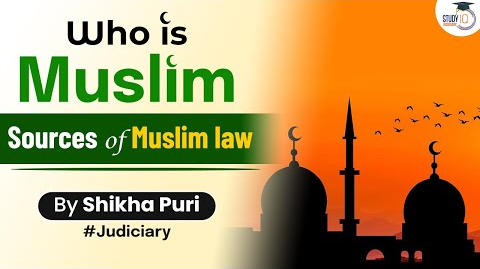Table of Contents
Sources of Muslim Law
Muslim Law
Who is a muslim?
- The term Muslim means submission. A Muslim is a person who follows Islam. Muslim law applies to a born Muslim or a person who is a convert Muslim.
- In Azima Bibi v. Munshi Samalanand, (1912) 17 CWN 121, it was observed that a child born out of a Muslim couple would be Muslim, even if he by choice goes to a Hindu temple. The person would be a Muslim, till the time he does not renounce his religion and converts to another religion.
Source of Muslims law
- The primary sources
- Secondary sources
The primary Sources
- Quran
- the Sunnat (the way of the Prophet/Tradition),
- the Ijma (Opinion/consensus of Islamic scholars)
- Qiyas (reasoning by analogy).
Secondary sources
- Judicial decisions
- Customs
- Legislation.
Quran
- The word Quran is derived from the Arabic word Qurra which means to read. Every word of Quran is the word of god, communicated to the Prophet Mohammed through angel Gabriel for the benefit of mankind, at different times, places, and situations during the period from 609 to 632 A.D (23 years).
- The Quran was disclosed over two periods which are:
- Meccan
- 2.Medinan
The Sunnat
- Sunnat is also known as Hadis or Sunna, it is the traditions of the Prophet Mohammed. The term Sunnat means a procedure, the trodden path or a way of action.
Ijma
- Ijma is a consensus within Muslim jurists on a particular legal issue. In simpler words when Quran and other traditions were not able to provide any rule of law for a particular problem, the jurists unanimously gave their decision and this was referred to as Ijma.
Qiyas
- Qiyas is the fourth primary source of Islamic law, it means analogical reasoning.
Secondary Sources
Judicial Decisions
- Our Indian judiciary at several instances interpreted Muslim law in several cases. All these interpretations is generally relied upon primary sources. Legislation, opinion of jurists and courts have settled many important legal anomalies using judicial interpretations.
Customs
- Customs are basically practices that people follow continuously for a long period of time. In fact, it is followed for so long that it obtains the status of law in some cases. In Muslim law there are various customs which regulate the practices of people.
Legislation
- Muslim law in India is not codified, but the parliament has made some laws to regulate Islamic practices. For ex. The Muslim personal law (Shariat) Application Act, 1939.This act deals with the marriage, succession, inheritance and charities among Muslims
- KAZI ACT 1880, Dissolution of Muslim Marriages Act, 1939, The Muslim Women (Protection of Rights on Marriage) Act, 2019






















 WhatsApp
WhatsApp